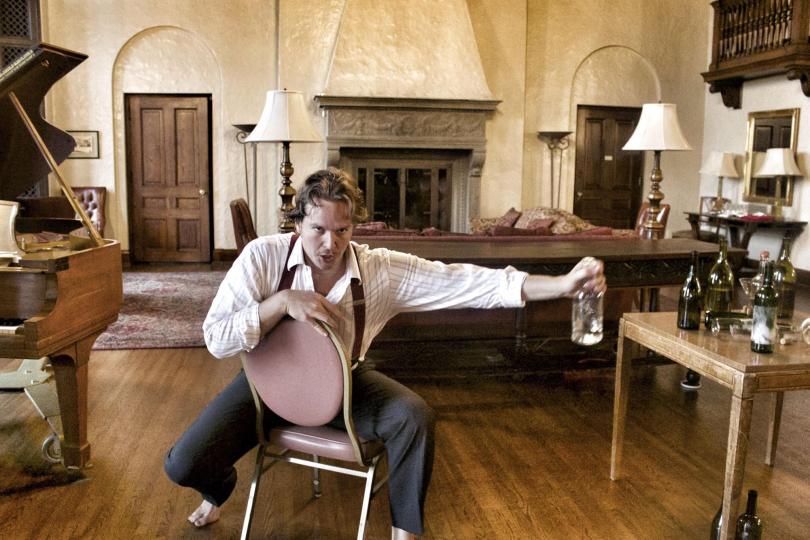Hitting the space’s high notes

The arched windows in the Woman’s Club of Minneapolis let in the late afternoon sun. As people gathered into closely-set chairs, a man who would be singing the lead swooped down with a tray of hors d'oeuvres. “Welcome to my club,” he smiled.
Skylark Opera Theatre and Angels & Demons Entertainment set their co-production of Don Giovanni in the roaring ‘20s with “Donny G.” as a gangster-like club owner. The company’s use of the Woman’s Club was the defining factor of this production. Robert Neu’s staging made more than the most of this space, and it served every other piece of the show.
The lounge
If it was not already clear where we were, the ensemble created the club when they danced onstage, glasses and bottles in hand. They were decked out in pastel period costumes by Samantha Fromm Haddow, which were elegant and never distracting.
As the revelers drank, Donny G. made his entrance from a staircase at one end of our found stage. It would be here, too, that he would make out with his first of a few lovers over the course of the night. Gabriel Preisser was magnificent in the title role, jumping the lines between charming, unpredictable, and downright dangerous. As Donna Anna, Karin Wolverton’s soprano set the tone for the opera’s stellar vocals.
Advising his employer to lay off on ladies and partying, Andrew Wilkowske’s Leporello was the show’s comic and voice of reason. He made great use of Preisser and Neu’s humorous English translation that included phrases like “go to hell,” “this sucks,” and about the composer himself, “Mr. Mozart is so overrated.” His words of advice hit home when Giovanni gets into a fight and kills Donna Anna’s father (with a fireplace shovel, no less).
Then Tess Altiveros walked in. Stunning in Skylark’s last production, The Tragedy of Carmen, she was on fire in this show too. As Donna Elvira, she was heavily pregnant and looking for Don Giovanni, whom she scolded for leaving her.
When the scene ended, two cast members, arm in arm, told the crowd that the whodunit would continue with a wedding, not in this room, but ...
In transition
They told us to go to the ball room. The whole crowd was suddenly on its feet, murmuring and shuffling to the exits, down the carpeted stairs, and through a shiny tiled hall. We had become part of the opera in a way a lot of performances might not let us. People chatted, making new friends as they sat down with new neighbors in the audience. Despite the flawless singing and dangerously good interpretation of Mozart, the transitions gave this show more life than anything — enough even to justify calling it an “experience.”
After Quinn Shadko’s affecting performance as the young bride Zerlina, we left the ballroom and climbed the stairs again. I met a new group of people each time we did this. During the five minutes of moving time, we would talk about what brought us to the opera. I got questions from partners of arts enthusiasts who wondered about our theater scene — “is there really a lot going on?” Or, talk of this company’s earlier days and how it has changed. The audience was by and large older, whiter, wealthier. (The tickets started at $70. In its ambitious choice of space, this was not an accessible show. Though I doubt you could sit that close to the action for less than that at some larger operas.)
In the dining room, we were served small bites of food as the company brawled in their eveningwear. I sat so close this time that Preisser’s voice shook the air around me. The cast’s singing in unison multiplied that times ten.
Auditorium
Strangely enough, the weakest part of the show took place in the club’s theater. In this more traditional setting, the shenanigans lost the novelty they had in other rooms. For the finale, we all climbed the stairs together, feeling like we were in some sort of life-sized game of Clue, exploring echoing rooms and never sure what would come next; smiling at the ensemble’s strategic placement between us and corridors we should not go down.
We finished where we stared, in the lounge, where the windows were dark with the night sky over Loring Park. Benjamin Sieverding stood outside them as the ghost of the man Don Giovanni had killed — every detail mastered in the use of this space as he stood still and silent while the others sang.
It ended with dessert and trips out to that balcony, and an intimate knowledge of a building not just for what it was but for what this talented group of artists had made it into.
Maybe Mozart is overrated, but Skylark Opera definitely is not.


